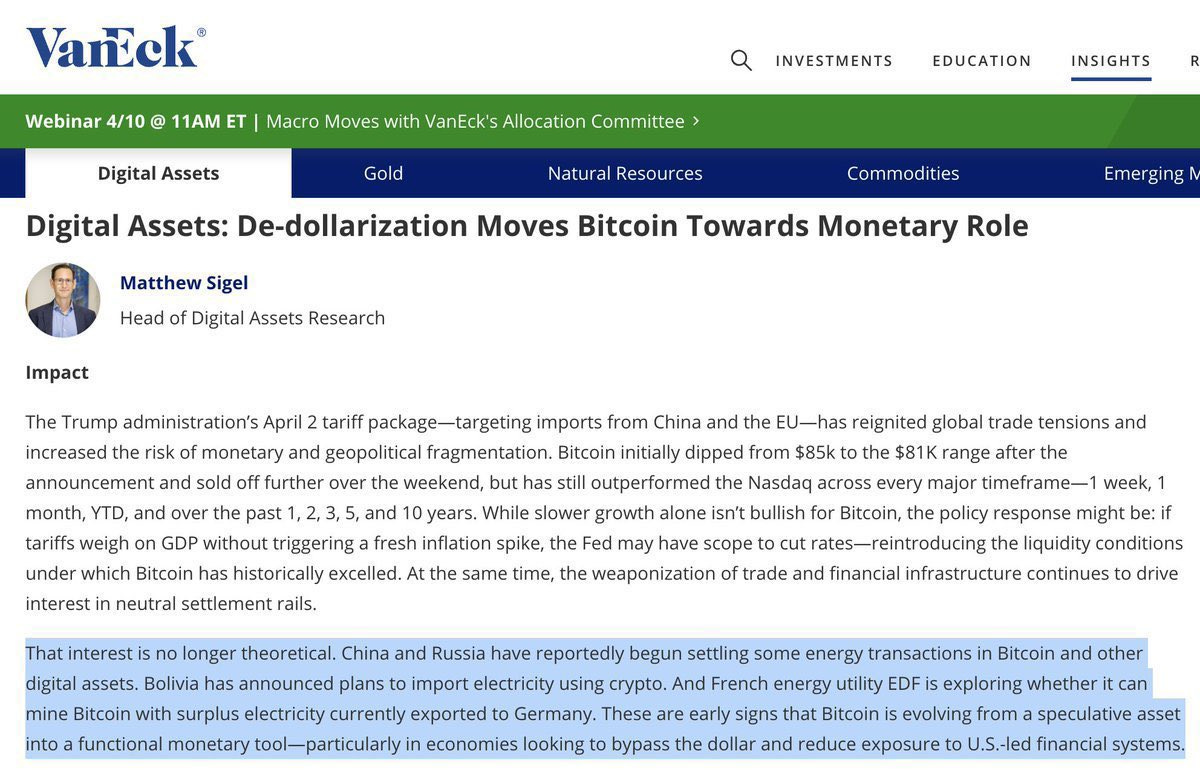Second order effects of the tariffs, on Bitcoin
The road to bitcoin being included in national reserves along with treasuries and gold
No two countries have ever traded with each other using Bitcoin. Nor has any multinational corporation done so. Bitcoin’s purported function as a medium of exchange has, therefore, historically been limited to the Silk Road and exchanges for other cryptocurrencies. That famous transaction involving pizzas does not count.
That said, there is good reason to believe that once the first set of countries begin trading with each other using Bitcoin, its status as a recognized medium of exchange will gradually cement, and its price shall reflect this newfound moentary premium. Bitcoin’s client base will then be primarily sovereign nation-states, using it as a medium of exchange rather than merely a so-called store of value.
Trump’s tariffs do more than just raise the price of imported goods—they indirectly tighten access to U.S. dollars. In a global system where the dollar serves as both the dominant reserve currency and the primary medium for international trade, this creates a dangerous knock-on effect. When trade slows—especially trade with the U.S.—so does the flow of dollars into countries that rely on export revenues to earn them.
This leads to two immediate problems. First, a shortage of dollars means less capacity to pay for essential imports—commodities, food, energy. Second, and more critically, it creates stress for countries with substantial dollar-denominated debt. If they can’t roll it over or service it, financial instability quickly follows. In effect, tariffs don’t just disrupt trade—they can quietly weaponize dollar scarcity.
National debt is US dollar-denominated because nobody wants to lend you money in the shitcoin that the central bank of the borrowing country can print. The only exception to this rule is the US dollar. Hence the exorbitant privilege. The US government can print itself out of any debt. I think this is true, inflation being the only constraint. The modern monetary theory propelled by Professor Stephanie Kelton et al is probably correct. However, it's extremely dangerous because this power is so enticing to politicians that corruption is inevitable, and once corruption sinks in, cataclysm is inevitable. But we are not there yet, and the powers in office right now seem determined to reduce America’s debt and trade deficit, in doing so, soundly refusing the allure of MMT.
What does running short on dollars mean for a country?
Dollar shortage for a countries with a lot of long-term obligations is extremely dangerous for those nations heavy in dollar-denominated debt, or operating currencies pegged to the US dollar. When access to dollars dries up, the effects can be catastrophic. This is precisely what happened during the 1997 Asian Financial Crisis, when countries like Thailand and South Korea saw their currencies collapse as they ran out of dollar reserves needed to roll over external debt. Thailand's central bank was forced to abandon the baht's peg to the U.S. dollar after burning through billions in reserves, triggering a cascade of devaluations across the region. South Korea, meanwhile, came within days of sovereign default before accepting a $58 billion bailout package from the IMF, which came with strict austerity conditions.
A similar dynamic unfolded in Argentina in 2001, when its dollar peg became unsustainable amid capital flight and dwindling reserves, leading to a sovereign default and a severe economic depression.
In face of financial disaster due to dollar shortage, Washington might extend a lending hand or Federal Reserve swap lines to close allies—like it did with South Korea, Singapore, and Brazil during COVID—but for countries on America’s "naughty list," such as and especially China, dollar shortages could become existential threats, edging them toward debt default, systemic banking crises, or even regime collapse. In between that, it is also possible that we seen hitherto unthinkable financial actions from the US, including the seizure of assets in the US owned by hostile foreign powers.
These are the facts for China:
China has around $1 trillion in dollar-denominated external debt.
It has ~$760 billion in U.S. Treasuries, which are liquid and can be sold for dollars.
It also runs a large trade surplus (e.g. ~$105 billion in Dec 2024 alone), which helps it accumulate dollars.
Trump’s tariffs are now turning off China’s tap to accumulate dollars. And the Chinese government’s dumpage of USTs is also reducing their ability to service their dollar-denominated external debt. This does not sound like a good receipe to me.
As a side note, this is why there are people who say that eventually the Chinese government will seize the $412 billion of reserves backing the Hong Kong dollar to pay its debts, thereby causing a depegging of the Hong Kong dollar. Such a change can be sudden and violent, or it can come as an act of benevolence backed by questionable economic reasoning.
Now, let us return to the practical question nation-states must face: if you're running short on dollars but still need to import raw materials, what can you do? Most countries can't simply pay with their own currency, since it's not widely accepted outside their borders—unless that currency enjoys global circulation, like the U.S. dollar or the euro. The euro is a viable alternative in some contexts, as is the Swiss franc.
The state might also consider dollar-pegged or dollar-proxy currencies—such as the Hong Kong dollar, the Bahamian dollar, or the UAE dirham—might serve as substitutes, since they're pegged to the U.S. dollar and implicitly backed by dollar reserves. But here’s where things get tricky: the United States government can pressure these countries to restrict capital flows to adversarial or "unfriendly" nations. Indeed, as an example, the Bahamian dollar does not circulate outside of the Bahamas. You are not allowed to take Bahamian dollars outside of the Bahamas at customs. The dynamic is imperial in character: the U.S. plays the role of benevolent financial overlord, guarding the integrity of the dollar zone. But should a client state like the Bahamas misbehave—say, by allowing sanctioned actors to transact through Bahamian dollars—the U.S. can retaliate swiftly. It can freeze the Bahamian dollar’s access to U.S. clearing systems, dump Bahamian reserves, and effectively collapse the peg. When the Bahamas tried to launch their own CBDC called the Sand Dollar, they got some pretty non-ambiguous instructions from the Federal Reserve that is not a good idea. This is something that the US could do to any currency pegged to the USD around the planet. This is the latent threat hanging over every currency pegged to the U.S. dollar: your monetary sovereignty exists at the pleasure of Washington.
This means that the Hong Kong dollar is facing both threats from the Chinese and the United States. Suffice it to say I wouldn’t hold assets in HKD. Kyle Bass can fill in the rest of the thesis.
Still, that detour did not fully answer the practical question: what can a country actually do when it runs short of dollars?
You can either find a way to earn dollars, you barter, or you accept dollar-substitutes that you then sell for dollars. In other words, you need alternative forms of money.
As we explored above, you can try the Euro, dollar-proxies, gold even, or you can try bitcoin.
The appeal of bitcoin is quite obvious. We all know the slogans and soundbites: permissionless, decentralised, secure, immutable… etcetera etcetera ad infinitum. It cannot be sanctioned by the US government. You can mine it by energy. Waste energy even. This free and democratic permission is mining of bitcoin gives some nations a chance. The civ 6 map has changed due to advancements in the technology tree.
Bitcoin is also extremely liquid. True, its volatility is far greater than the dollar’s—but that’s only a problem if you’re going to hold it. If you’re using it just for a transaction, a one-off transaction, what will happen is that the two parties will agree on a price, in dollars, then simply use their own national currencies to buy bitcoins equivalent to the dollar amount, send it over, and then the other party will sell the bitcoin for dollars or whatever currency. Neither party will likely keep any residual reserves of bitcoin in this genesis transaction. But once this becomes a reoccuring practice, a new habit and custom will gradually develop - where states will reserve their bitcoin, first as pocket change, eventually as full blown savings. Indeed, if it becomes routine, it becomes rational to preemptively accumulate Bitcoin, just as central banks accumulate gold or foreign reserves. The two premises of (1) states using bitcoin to trade, and (2) states saving some bitcoins for later transactions instead of selling them all for cash, creates a virtuous cycle, a flywheel, where more and more states are encouraged to save it and not sell it. Because, if you’re going to use bitcoin to trade anyway, and other states are not selling it, you’re better off hodling onto your bitcoin lest you buy them at a higher price later.
Once preemptive bitcoin purchases is viewed as rational, the inclusion of bitcoin in in the national treasuries becomes reasonable. It’s simply the accumulation of another form of money, just like gold, dollars, and US treasuries.
This does not mean the end of the dollar’s reign. Reserve currencies are not dethroned by novelty—they are unseated slowly, through decay, over decades. The dollar’s incumbency is secured not just by network effects, but by a massive ecosystem of legal, financial, and military infrastructure. The United States as a country still has massive room to grow, and therefore the dollar as a proxy of that potential is far from exhausted. The fact that the United States of America still does not yet encompass the entirety of the two Americas, is a sign to me that Peak America has not yet arrived.
Bitcoin’s rise as a secondary reserve asset does not threaten the dollar’s primacy. It simply introduces a new class of reserve—one that sits somewhere between the ultra-liquid U.S. Treasury and the deeply inert store of value that is physical gold. Bitcoin is, in some sense, the third reserve. Cash and U.S. Treasuries are for expenditure and liquidity. Gold and art are for existential catastrophe. Bitcoin fits in between the basket of currencies reserves should encompass, and gold.
There are implications here for CEXes I think. Every country that becomes open to using Bitcoin as a payment rail will likely need infrastructure: nationalized custodians, trusted exchanges, local liquidity pools. They will want local CEXes and not just Binance and Coinbase, just like they will want local banks and not just JP Morgan and HSBC. They will also demand alternative stablecoins—not just U.S.-regulated ones like USDC or USDT, but decentralized or regionally issued ones that can resist American or Chinese pressure.
I do not think the problems surrounding bitcoin’s store of value thesis are likely to jeopardise these developments. These problems are best illustrated in Nicholas Nassim Talib’s Bitcoin Blackpaper, and A model for bitcoin’s security and the declining block subsidy. There are strong and idiotic arguments in NNT’s paper. There are genuine issues highlight by the second paper. But neither will become real problems until it happens. Such problems are theoretical and they sound clever on paper philosophically. But they have not yet been tested and whether those propositions are true is entirely empirical matter. And perhaps humans will react differently to this kind of new object and its new metaphysics such that these arguments won’t fly.
Exporting Dollars and Prosperity
Paper money has no intrinsic value. We all know that. The original value of the U.S. dollar came from its peg to gold. Once the United States abdicated its responsibility as the steward of global fin…



